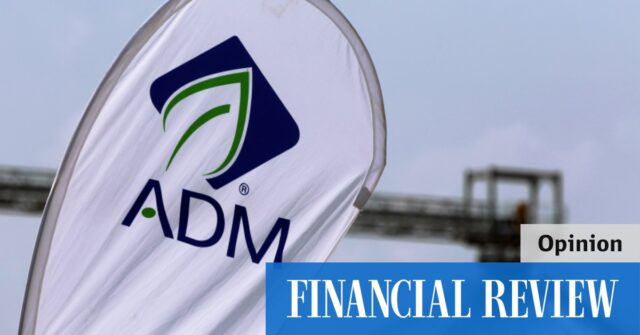ADM has so far provided limited information about the accounting problem. Still, we can draw a few tentative conclusions:
Sell-off appears excessive
First, the company has disclosed that the investigation centres around its nutrition unit.
In the first nine months of 2023, that segment delivered adjusted operating profits of $US468 million ($722 million), about 10 per cent of the company’s total during the period. In 2022 and 2021, nutrition accounted for 11 per cent and 15 per cent of the operating profit, respectively. If any accounting trouble only impacts its nutrition business, the sell-off would appear excessive. But it’s early days.
The investigation started after the US Securities and Exchange Commission asked Archer-Daniels-Midland to provide it with some documents. ADM said it was co-operating with the SEC.
Second, despite the probe, the rest of the business appears solid. ADM trimmed its 2023 full-year adjusted earnings to “above” $US6.90 per share, down just a tiny bit from a previous outlook of more than $US7 per share.
If confirmed when the company releases its quarterly results, it would suggest that any accounting problem is limited. On Sunday, ADM also reiterated its guidance for its two biggest business units – agricultural services and oilseeds, and carbohydrates solutions. If confirmed, that would suggest the main profit centres are still performing.
Third, there are a few “buts”. The importance of the nutrition business goes beyond the most recent profits. ADM has spent heavily here over the last decade, including its biggest-ever acquisition: the $US3 billion purchase of Wild flavours.
The idea behind the expansion was to diversify away from the razor-thin margins of buying, selling and processing raw materials such as corn and soybeans and actually produce the flavours that food and beverage companies require.
Declining margins
That diversification was what justified the premium at which ADM traded relative to others in the industry, notably its arch rival, Bunge. If that diversity ends up lacking, its shares need to reprice lower. In its last earning conference call, ADM touted its flavours business in particular as a “growth engine” that “will act as pacesetter for the rest of our portfolio”.
Four, when it rains, it pours. The agricultural commodity industry was already battling declining margins as the impact of COVID-19 disruptions and Russia’s war on neighbouring Ukraine began to fade.
Trading profits, which surged from 2020 to 2022 to eye-watering levels, were expected to drop significantly in 2024. This was the year ADM really needed its nutrition business to show the benefits of that diversification drive – especially since Bunge has been busy expanding by buying Viterra, the Canadian grain trading business of Glencore. Before Monday, ADM shares had already dropped 30 per cent from the all-time high set in early 2022.
And then there’s some important context. Investors were bound to be merciless. Over the last decade, two large commodity traders – Noble Group and Hing Leong – have collapsed amid accounting irregularities.
Noble was publicly listed in Singapore, while Hin Leong was privately owned. Other smaller traders have also collapsed. I’m not suggesting any problem at ADM is similar, but shareholders may be pricing in a worst-case scenario.
ADM itself has a chequered history that some investors might remember. In the 1990s, the company was at the centre of a commodity price-fixing conspiracy that later became the basis of the film The Informant! starring Matt Damon.
Archer-Daniels-Midland pleaded guilty to the price-fixing charges in 1996. Since then, ADM has worked hard to rebuild trust with investors. But it’s an uncomfortable backdrop.
All of the above points to one certainty: Time is of the essence.
In the commodity industry, trust is won over decades and lost in minutes. ADM needs to quickly offer more information to shareholders. A good start would be a conference call, rather than a short statement, where management could explain the extent of the investigation.
Bloomberg Opinion




